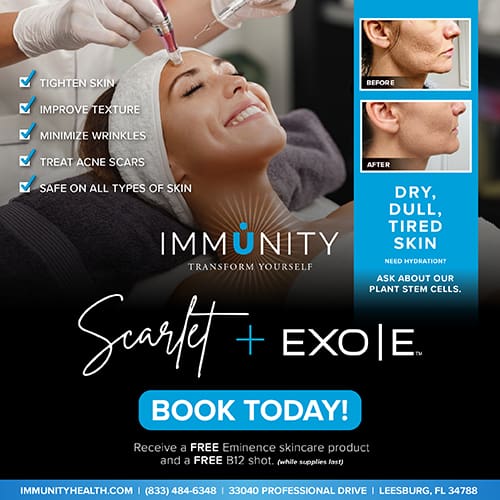By James Combs
A budding industry
The popularity of CBD products is growing like a weed.
A month before his son was born, Dr. Jeffrey Glover was plagued by back and knee pain. Sleepless nights became the norm.
Desperate for relief, he turned to CBD—short for cannabidiol—a compound found in marijuana and hemp plants. He had already witnessed its therapeutic benefits on his dog, which perked up and lived two months longer than expected after a cancer diagnosis.
One evening before bed, Dr. Glover consumed several milligrams of CBD oil. Red eyes, dry mouth, and insatiable food cravings were noticeably missing.
“I woke up the next morning pain-free, and I felt rejuvenated after a good night’s sleep,” he says.
He became convinced that CBD is more helpful than it is hype. So much so that he’s now selling CBD oil at his Leesburg-based practice, Glover Chiropractic Clinic, and seeing patients walk upright with decreased pain. Days after taking the oil, patients tell him “my pain has magically disappeared” or “I’m noticing that it also helps me sleep better.”
“CBD oil isn’t a cure, but if it makes life better, that’s pretty good,” says Dr. Glover, who began selling CBD oil within the past year. “You have people who would kill to get 20 percent pain relief.”

Dr. Glover and his patients are not the only ones doling out rave reviews for the medicinal benefits of CBD, which is made from the stems and roots of hemp plants. Those parts contain little or no tetrahydrocannabinol, or THC, the mind-altering chemical that creates a natural high.
In the past couple of years, CBD has become all the rage for non-stoners seeking a safer alternative to pain medication and other prescription drugs. In the United States, more than 1,200 independent health food stores—as well as pharmacies and convenience stores—are selling a goldmine of CBD products that come in sublingual drops, gel caps, vape oil, gummy candies, and other attractively packaged potions. It’s also being added to various foods, drinks, soap, body lotion, and lip balm.
The tsunami of CBD-infused products has hit with such force that intrigued customers have been flooding stores and asking a popular question: Does it really help relieve pain?
Cliff Witmann, an employee of Lake Nutrition Center in The Villages, answers that question with a firm “yes.” He began taking CBD oil in 2013 to combat the “unbearable anxiety” he experienced after having his cancerous thyroid removed. Now, he takes 16 milligrams twice a day and receives a feeling of relaxation rather than a mind-altering high.
“It’s like taking a nice, warm shower and melting the tension,” he says. “If I go several days without it, I can feel tension build up in my body.”
Cliff has spent countless hours researching CBD’s role in treating health issues. He eventually convinced Debbie Wittman, his mother and owner of the store, to sell CBD products.
He believes CBD is poised to be a rising star rather than a short-lived fad. In fact, Hemp Business Journal, an industry market research publication, predicts that the CBD market will grow by 700 percent in 2020.
“CBD sells itself because of the proven results,” Cliff says. “People come here to buy the product and they tell their friends and neighbors how well it works. That’s how we sell so much.”
Cliff estimates that the store sells 60-80 bottles of CBD oil each week. CBD oil sales average $10,000 a month at Bay Pharmacy in Eustis.
“In Lake County, the popularity of CBD has exploded in the last year,” says Gordon Punt, a pharmacist at Bay Pharmacy. “I’ve never seen anything like it. Different products come out all the time and are promoted for various disease states, but I have never talked about a product so many times throughout the day to so many different patients.”

Two events in the past year may bolster the country’s already burgeoning CBD industry. In June 2018, the U.S. Food and Drug Administration approved Epidiolex, a CBD-derived pharmaceutical drug that treats seizures for patients with Lennox-Gastaut syndrome. It’s the first prescription, plant-derived cannabinoid medicine in the U.S. and could result in growing acceptance of CBD products.
In December, President Donald Trump legalized hemp by signing the farm bill, which allows hemp-derived products to be shipped across state lines, expanding options for exports and sales. The bill moves CBD out of a legal gray area.
That’s wonderful news for patients such as Eugene Morrisette, a 98-year-old resident of The Villages who enthusiastically refers to CBD oil as a “miracle drug with no side effects.” He began taking oil to boost his energy level.
“Within one week, it had helped different areas of my body,” says Eugene, who was a ballroom dancer until age 96. “I also used the CBD ointment because several of my fingers were sore. The next morning, the pain had disappeared.”
Aside from increased energy, CBD oil reportedly has other health benefits. Devotees claim it’s beneficial for those seeking alternative treatments to a long list of ailments, such as arthritis, muscle pain, neuropathy, fibromyalgia, depression, and anxiety.
Some may be skeptical that one product could treat numerous conditions and chalk it up as over-hyped snake oil. But enthusiasts say its ability to relieve pain is rooted in basic science.
CBD acts on the body’s endocannabinoid system, which regulates cell activity, pain, and inflammation and helps the body adapt to outside stressors. Within this system are two cannabinoid receptors: CB1, located in the brain and central nervous system; and CB2, found throughout the body on cells associated with the immune system. Phytocannabinoids, or plant-based cannabinoids from hemp, activate the CB1 and CB2 receptors produced naturally in the body, giving the endocannabinoid system a boost and providing the medicinal benefits behind CBD.
“You are taking a natural plant that happens to have the same molecules you have in your own body,” Cliff says. “It’s like having a motor inside of your own body that just never had any fuel. CBD oil is fuel to run that motor efficiently.”
Gordon, the Eustis pharmacist, agrees.
“This is why CBD has a wide, expansive effect on the body. It’s why CBD can help with pain, anxiety, and sleep,” he says.
However, neither Cliff nor Gordon promote CBD products as a cure-all for everything. To date, no long-term research has been conducted to confirm or deny the claimed benefits of CBD, and manufacturers cannot claim the products will treat or cure any diseases. Product literature contains phrases like “restore vitality” and “may keep healthy people healthy.”
“I usually get one of three responses from people,” Gordon says. “First, they like it and say it helps. Second, they say it helped my pain but not my sleep, or vice versa. Third, it didn’t do anything for them. That last response can mean one of two things. The body is complicated and CBD products may not be the right answer for that person, or they may not have found the right dosage. It is very patient-specific, and the dose is wide-ranging.”
Yet, in Cliff’s experience, only five out of 100 patients experience no therapeutic benefits whatsoever.

“I’ve gotten 30 people off opioids by introducing them to CBD oil,” Cliff says. “While there may not be long-term government research, all I can tell you is the results we’ve seen and the countless testimonials from this store. We receive anywhere from 10 to 20 new testimonials each week.”
If Gordon had his way, CBD products would be the first line of defense in pain treatment. He’s encouraged that some local family doctors are recommending CBD oil to help ween patients off opioids, which he says has side effects such as withdrawal symptoms, constipation, decrease in hormone levels, and death from overdose.
“Although I’m trained in Western medicine, I have a real interest in holistic and functional medicine,” Gordon says. “Between hours of research and watching many webinars, I feel that CBD products are safe. By recommending those products, I’m not going to hurt anybody, and instead of experiencing side effects, the products have wonderful benefits people can experience.”
Sometimes, that message falls on deaf ears. Though weakening considerably, stigmas still remain. The most common one is that CBD gets users high. However, products must contain 0.3 percent or less of THC, therefore eliminating the high that recreational marijuana users seek. Nor will it cause users to fail a drug test.
Both men combat those stigmas through education. Cliff offers a monthly question-and-answer cannabis class at Comfort Suites in The Villages that typically draws 60 people. Meanwhile, Gordon has luncheons with local doctors to promote the pharmacy and CBD products.

“My job isn’t to overcome stigmas; it’s to show people why CBD is beneficial and why they should take it,” Cliff says. “I never sell. Everything I do is education, and most people who come here looking for products are doing so based on referrals from existing CBD oil customers.”
During a time when word of mouth about the benefits of CBD is spreading like wildfire, Dr. Glover, the Leesburg chiropractor, says there’s little need for a marketing push.
“Patients bring it up to me on their initial exam. Very seldom do I bring up CBD oil,” he says. “You can’t blame them for seeking a natural way to alleviate pain without unwanted side effects.”
James Combs was a pillar of Akers Media Group since its inception in 2008. Over the years, he had the honor of interviewing Lake & Sumter County's most fascinating personalities, from innovative business owners to heroic war veterans, bringing their incredible stories to life. Throughout his career, James earned over 50 awards for writing excellence, a testament to his talent and dedication. In 2021, he was inducted into the Akers Media Group Hall of Fame. Sadly, James passed away in 2023 after a courageous battle with cancer. His legacy of storytelling and excellence continues to inspire us all.







































